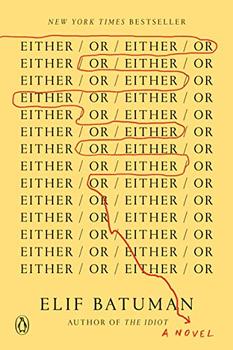Summary | Excerpt | Reviews | Beyond the book | Read-Alikes | Genres & Themes | Author Bio

"I felt that this is what I was fighting against, and always had been: the tyranny of the particular, arbitrary way that things happened to have turned out."
Elif Batuman's debut novel, The Idiot, published in 2017, chronicles a year in the life of Harvard freshman Selin, the daughter of Turkish immigrants who has vague notions of becoming a writer and thinks she may achieve this goal by looking closely at the way language works. Though she is derailed from her objective, the events of Batuman's first novel take Selin on an odyssey through the Hungarian countryside in the summer between her freshman and sophomore years as she chases the affections of an aloof older student, Ivan, who has just graduated and is about to move to California.
Either/Or picks up where The Idiot leaves off; Selin has just arrived at her sophomore dorm, and though she hasn't spoken to Ivan since their trip to Hungary in July, she anticipates an email from him explaining everything: why he encouraged her to come to Hungary only to act coldly toward her and what the exact nature of their relationship is. As no such email awaits Selin in her inbox, she turns to external sources to try to make sense of her own feelings for Ivan: she reads Tatyana's monologue from Pushkin's Eugene Onegin, Kierkegaard's Either/Or (see Beyond the Book) and André Breton's Nadja; she listens to Fiona Apple and the Fugees; she audits a literature course called Chance which explores "chance as an artistic praxis, a conduit to the subconscious."
Though it can be read as a standalone novel, part of the charm of Either/Or is in the reader having followed Selin's journey from its inception. Readers who opt to read only Either/Or will not be missing out on many critical plot details that can't be inferred, but they will undoubtedly draw less satisfaction from seeing the extension of Selin's character arc.
Following in The Idiot's footsteps, Either/Or is a relatively plotless endeavor, and will not appeal to readers who need a fast-paced story to keep them engaged. But for the more contemplative reader, this pair of novels is nothing short of a delight. The strength of both books is Selin's incisive narrative voice. In turns dark, funny and philosophical, Batuman's writing is what makes her novels shine so bright, and stand out among a sea of books about disaffected, romantically doomed young women.
Selin is a self-conscious narrator, and the question of whether she is living a life worthy of being the protagonist of a novel underscores her own observations. "Love was dangerous, violent, with an element of something repulsive; attraction had a permeable border with repulsion. Love had death in it, and madness. To try to escape those things was immature and anti-novelistic," she reflects, while questioning whether she may be attracted to women (the answer is no, as she believes the discomfort she feels around men must herald some greater significance). Selin's sexuality, only an incidental element to her relationship with Ivan in The Idiot, takes on a more central role in Either/Or, one element of many which Batuman chooses to deftly expound upon in this sequel, as Selin relentlessly questions the meaning of the things happening around her, as well as her own role in them.
Batuman's novels may not be for everyone; they are designed to appeal primarily to those with enough patience to read hundreds of pages of a character thinking, rather than doing. But fans of The Idiot and readers who see their own awkward undergraduate experiences and self-conscious thoughts reflected in Selin's story are destined to love Either/Or just as much as its predecessor. It feels like a gift, for readers who became so invested in Selin, that Batuman has allowed us to read the next chapter in her journey.
![]() This review was originally published in The BookBrowse Review in May 2022, and has been updated for the
June 2023 edition.
Click here to go to this issue.
This review was originally published in The BookBrowse Review in May 2022, and has been updated for the
June 2023 edition.
Click here to go to this issue.

If you liked Either/Or, try these:

by Sarah Manguso
Published 2025
A searing novel about being a wife, a mother, and an artist, and how marriage makes liars of us all—from the author of Very Cold People and 300 Arguments.

by Marie-Helene Bertino
Published 2025
A wise, tender novel about a woman who doesn't feel at home on Earth, by the acclaimed author of Parakeet.
Your guide toexceptional books
BookBrowse seeks out and recommends the best in contemporary fiction and nonfiction—books that not only engage and entertain but also deepen our understanding of ourselves and the world around us.